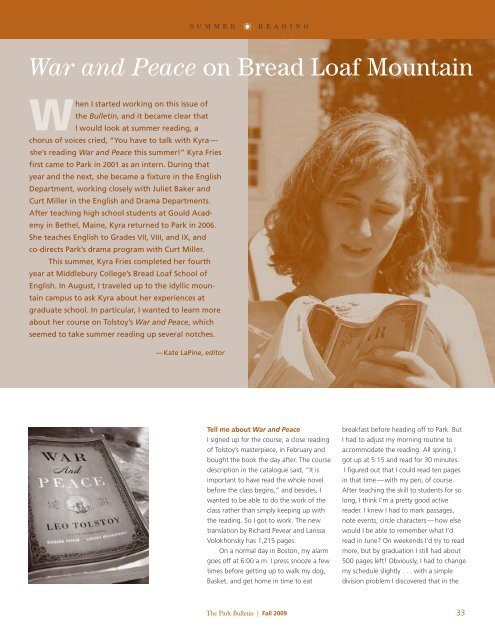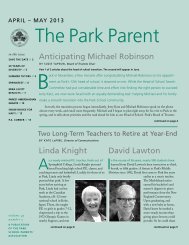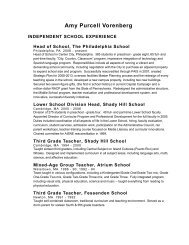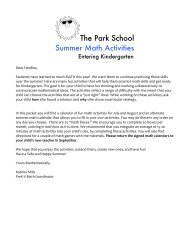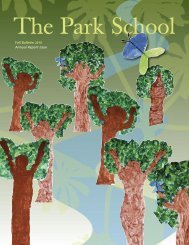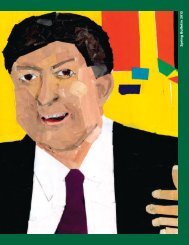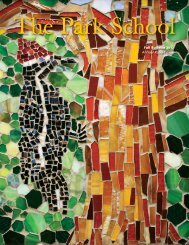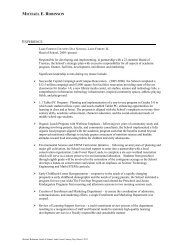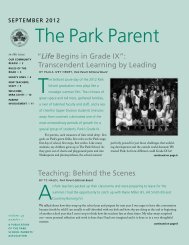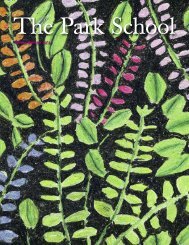⢠ParkBulletinCover - The Park School
⢠ParkBulletinCover - The Park School
⢠ParkBulletinCover - The Park School
You also want an ePaper? Increase the reach of your titles
YUMPU automatically turns print PDFs into web optimized ePapers that Google loves.
S U M M E R<br />
3<br />
R E A D I N G<br />
War and Peace on Bread Loaf Mountain<br />
When I started working on this issue of<br />
the Bulletin, and it became clear that<br />
I would look at summer reading, a<br />
chorus of voices cried, “You have to talk with Kyra—<br />
she’s reading War and Peace this summer!” Kyra Fries<br />
first came to <strong>Park</strong> in 2001 as an intern. During that<br />
year and the next, she became a fixture in the English<br />
Department, working closely with Juliet Baker and<br />
Curt Miller in the English and Drama Departments.<br />
After teaching high school students at Gould Academy<br />
in Bethel, Maine, Kyra returned to <strong>Park</strong> in 2006.<br />
She teaches English to Grades VII, VIII, and IX, and<br />
co-directs <strong>Park</strong>’s drama program with Curt Miller.<br />
This summer, Kyra Fries completed her fourth<br />
year at Middlebury College’s Bread Loaf <strong>School</strong> of<br />
English. In August, I traveled up to the idyllic mountain<br />
campus to ask Kyra about her experiences at<br />
graduate school. In particular, I wanted to learn more<br />
about her course on Tolstoy’s War and Peace, which<br />
seemed to take summer reading up several notches.<br />
—Kate LaPine, editor<br />
Tell me about War and Peace<br />
I signed up for the course, a close reading<br />
of Tolstoy’s masterpiece, in February and<br />
bought the book the day after. <strong>The</strong> course<br />
description in the catalogue said, “It is<br />
important to have read the whole novel<br />
before the class begins,” and besides, I<br />
wanted to be able to do the work of the<br />
class rather than simply keeping up with<br />
the reading. So I got to work. <strong>The</strong> new<br />
translation by Richard Pevear and Larissa<br />
Volokhonsky has 1,215 pages.<br />
On a normal day in Boston, my alarm<br />
goes off at 6:00 a.m. I press snooze a few<br />
times before getting up to walk my dog,<br />
Basket, and get home in time to eat<br />
breakfast before heading off to <strong>Park</strong>. But<br />
I had to adjust my morning routine to<br />
accommodate the reading. All spring, I<br />
got up at 5:15 and read for 30 minutes.<br />
I figured out that I could read ten pages<br />
in that time — with my pen, of course.<br />
After teaching the skill to students for so<br />
long, I think I’m a pretty good active<br />
reader. I knew I had to mark passages,<br />
note events, circle characters—how else<br />
would I be able to remember what I’d<br />
read in June On weekends I’d try to read<br />
more, but by graduation I still had about<br />
500 pages left! Obviously, I had to change<br />
my schedule slightly . . . with a simple<br />
division problem I discovered that in the<br />
<strong>The</strong> <strong>Park</strong> Bulletin | Fall 2009 33


